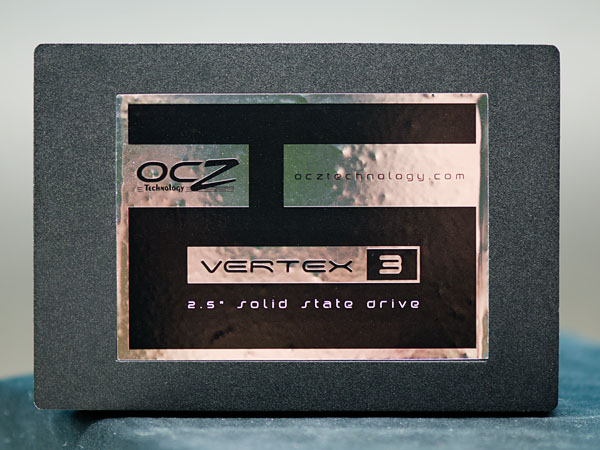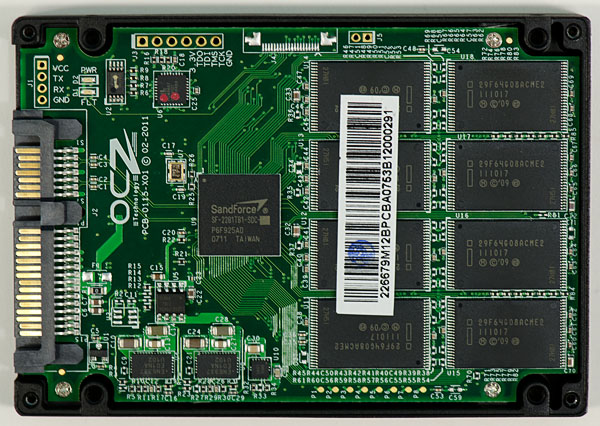The OCZ Vertex 3 Review (120GB)
by Anand Lal Shimpi on April 6, 2011 6:32 PM ESTThe Vertex 3 120GB
Whenever we review a new SSD many of you comment asking for performance of lower capacity drives. While we typically publish the specs for all of the drives in the lineup, we're usually only sampled a single capacity at launch. It's not usually the largest, but generally the second largest and definitely an indicator of the best performance you can expect to see from the family.
Just look at the reviews we've published this year alone:
Intel SSD 510 (240GB)
Intel SSD 320 (300GB)
Crucial m4 (256GB)
While we always request multiple capacities, it normally takes a little while for us to get those drives in.
When OCZ started manufacturing Vertex 3s for sale the first drives off of the line were 120GB, and thus the first shipping Vertex 3 we got our hands on was a more popular capacity. Sweet.
Let's first look at the expected performance differences between the 120GB Vertex 3 and the 240GB drive we previewed earlier this year:
| OCZ Vertex 3 Lineup | |||||
| Specs (6Gbps) | 120GB | 240GB | 480GB | ||
| Max Read | Up to 550MB/s | Up to 550MB/s | Up to 530MB/s | ||
| Max Write | Up to 500MB/s | Up to 520MB/s | Up to 450MB/s | ||
| 4KB Random Read | 20K IOPS | 40K IOPS | 50K IOPS | ||
| 4KB Random Write | 60K IOPS | 60K IOPS | 40K IOPS | ||
| MSRP | $249.99 | $499.99 | $1799.99 | ||
There's a slight drop in peak sequential performance and a big drop in random read speed. Remember our discussion of ratings from earlier? The Vertex 3 was of course rated before my recent conversations with OCZ, so we may not be getting the full picture here.
Inside the 120GB Vertex 3 are 16 Intel 25nm 64Gbit (8GB) NAND devices. Each device has a single 25nm 64Gbit die inside it, with the capacity of a single die reserved for RAISE in addition to the typical ~7% spare area.
The 240GB pre-production drive we previewed by comparison had twice as many 25nm die per package (2 x 64Gbit per NAND device vs. 1 x 64Gbit). If you read our SF-2000 launch article one of the major advantages of the SF-2000 controller has over its predecessor is the ability to activate twice as many NAND die at the same time. What does all of this mean for performance? We're about to find out.
RC or MP Firmware?
When the first SF-1500/1200 drives shipped last year they actually shipped with SandForce's release candidate (RC) firmware. Those who read initial coverage of the Corsair Force F100 drives learned that the hard way. Mass production (MP) firmware followed with bug fixes and threatened to change performance on some drives (the latter was resolved without anyone losing any performance thankfully).
Before we get to the Vertex 3 we have to talk a bit about how validation works with SandForce and its partners. Keep in mind that SandForce is still a pretty small company, so while it does a lot of testing and validation internally the company leans heavily on its partners to also shoulder the burden of validation. As a result drive/firmware validation is split among both SandForce and its partners. This approach allows SF drives to be validated heavier than if only one of the sides did all of the testing. While SandForce provides the original firmware, it's the partner's decision whether or not to ship drives based on how comfortable they feel with their validation. SandForce's validation suite includes both client and enterprise tests, which lengthens the validation time.
The shipping Vertex 3s are using RC firmware from SandForce, the MP label can't be assigned to anything that hasn't completely gone through SandForce's validation suite. However, SF assured me that there are no known issues that would preclude the Vertex 3 from being released today. From OCZ's perspective, the Vertex 3 is fully validated for client use (not enterprise). Some features (such as 0% over provisioning) aren't fully validated and thus are disabled in this release of the firmware. OCZ and SandForce both assure me that the SF-2200 has been through a much more strenuous validation process than anything before it.
Apparently the reason for OCZ missing the March launch timeframe for the Vertex 3 was a firmware bug that was discovered in validation that impacted 2011 MacBook Pro owners. Admittedly this has probably been the smoothest testing experience I've encountered with any newly launched SandForce drive, but there's still a lot of work to be done. Regardless of the performance results, if you want to be safe you'll want to wait before pulling the trigger on the Vertex 3. SandForce tells me that the only difference between RC and MP firmware this round is purely the amount of time spend in testing - there are no known issues for client drives. Even knowing that, these are still unproven drives - approach with caution.
The Test
| CPU |
Intel Core i7 965 running at 3.2GHz (Turbo & EIST Disabled) Intel Core i7 2600K running at 3.4GHz (Turbo & EIST Disabled) - for AT SB 2011, AS SSD & ATTO |
| Motherboard: |
Intel DX58SO (Intel X58) Intel H67 Motherboard |
| Chipset: |
Intel X58 + Marvell SATA 6Gbps PCIe Intel H67 |
| Chipset Drivers: |
Intel 9.1.1.1015 + Intel IMSM 8.9 Intel 9.1.1.1015 + Intel RST 10.2 |
| Memory: | Qimonda DDR3-1333 4 x 1GB (7-7-7-20) |
| Video Card: | eVGA GeForce GTX 285 |
| Video Drivers: | NVIDIA ForceWare 190.38 64-bit |
| Desktop Resolution: | 1920 x 1200 |
| OS: | Windows 7 x64 |












153 Comments
View All Comments
SolidSteel144 - Wednesday, April 6, 2011 - link
Why weren't other controllers tested?AMD's SB850 should also be able to handle these drives at full speed.
A5 - Wednesday, April 6, 2011 - link
If you go back and look at the Sandy Bridge launch article (http://www.anandtech.com/show/4083/the-sandy-bridg... you'll see that the Intel and AMD controllers have essentially identical performance. No reason to double his benchmark time for a 1% difference.acripps - Wednesday, April 6, 2011 - link
Newegg should have one to my door tomorrow......The last drop of my yule spending authorization. It will spend the next few years drifting through various machine incarnations....till it passes out of the pool in a give-away pc....somewhere around 2014.watzupken - Wednesday, April 6, 2011 - link
Following this issue I had with them, there won't be another OCZ product from me. Anand did point out a good thing that this issue is far from over since OCZ left buyers like myself and others out in the cold in the exchange. So other than the 60 and 120GB drives, no other drives are eligible for an exchange. Worst case, I got the affected drive back due to an exchange as the earlier drive failed. I return fast drive, get a slow drive back. How nice.devlabz - Wednesday, April 6, 2011 - link
Last few articles I ended up wondering why random read speed in SF controllers is slower than random write. I may have missed some important article explaining all that stuff, tho i read all of them. Isn't flash technology favoring the read speeds? Or it have something to do with lookups for the random data chunks?Most likely this will be the year where I'll try to get a SSD drive, and since my main reason will be to reduce the compilation times of my projects and I think that my biggest gain will be with highest random read IOPs drive? Am I wrong here? Or will it matter that much actually?
FunBunny2 - Wednesday, April 6, 2011 - link
I've read, don't remember where, that the IMFT 25nm NAND has on-die ECC circuitry. So:- did you find such
- is OCZ, or anyone, exercising it
???
Movieman420 - Wednesday, April 6, 2011 - link
Yeah...Tosh also just introduced their 'built-in ECC' nand.http://www.techpowerup.com/143619/Toshiba-Debuts-S...
The thing is, from what I understand anyway, that this nand will take the ECC burden off the controller. Thing is tho that SandForce controllers actually accell at ECC duties vs other controllers. This is a major selling point because as the die process continues to shrink, the ECC burden will continue to increase. So I guess I'm saying that I'm not too sure that more expensive ecc-nand would be practical if the controller doesn't suffer from the increasing ECC issue. Someone with more knowledge about how the SF controller works could probably answer the question best...cough*Anand*cough. ;)
Movieman420 - Wednesday, April 6, 2011 - link
The dismal performance of the Hynix nand was news to me. It does however explain why there were many users with horrid performance posting on the Ocz forums. I suspect these were the ones who where told that the problem was with their PC/Lappy. It has never once been mentioned on the forum that some drives may have low performing nand inside. No wonder they kept reminding folks not to open their drives 'due to potential warranty issues'. It seems Ocz was being less than forthcoming even before the whole 25nm nand thing blew up. I really really REALLY hope that Ocz puts an end to the shady business we've seem for the last few months...they are a great company with a great product. Omission and/or deception isn't gonna fly, especially when you cater to enthusiasts who are not exactly stupid. It's those same 'enthusiasts' who made Ocz's early success possible in the first place. I know that things have since changed and now the vast majority of their sales are to commercial and enterprise customers. They'd never think of pulling this with those customers, but they'll do it to the very people who made their early success possible in the first place? This post and my previous one come from the prospective of a die hard customer who also happens to be an Ocz shareholder as well. Just wish I could afford enough to actually have a say so in the way things go down. :Pxboxist - Wednesday, April 6, 2011 - link
Anand,I'm a very casual hardware enthusiast, and admittedly most of the technical aspects discussed in this article eludes me.
With that said, I don't need to understand everything to continue to be impressed by your enthusiasm for the products in your industry, and the way you carry yourself as an ambassador for all of your users. The way you went after OCZ here has to be applauded.
fixxxer0 - Wednesday, April 6, 2011 - link
after being disappointed in some way with just about every (large) company i've dealt with, whether it be insurance, auto makers, electronics, appliances, you name it... i am glad to see one finally accepting responsibility, and doing the right thing.i do not expect 100% perfection from every company at all times. i know sometime things are DOA, or defective, or flawed. but to actually have a company take that extra step and make it right without you having to sue them is commendable.
personally, when it comes time on deciding which drive to go with, it will mainly be on the numbers, but OCZ's ethics will definitely give them the edge if there is a toss up.